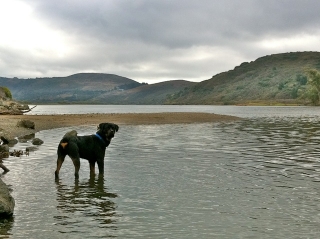This Is Not A Test!

If you are perusing this website and reading this blog post it’s likely that you take the time to train your dog. And, if you’re like most people you diligently set aside specific time for training in your day or week, especially if you’ve got a puppy or new dog in your life, or a specific goal in mind, and that is wonderful. Thank you for being such a cool and responsible dog owner!
However, once your reach your goals, or your new dog acclimates, or your pup grows up you’ll probably knock off, or at least greatly reduce your number of training sessions because your dog is trained.
And that is the precise moment your dog’s training begins to deteriorate.
Dogs are learning all of the time, behavior is always in motion, and because what’s normal for dogs is generally not desirable for us humans the direction of their behavior is going to go downhill unless we are actively working to shape it to please us.
Most of us fail to realize that pretty much every day, every interaction with our dog (especially in the first 2 years) is a TRAINING scenario, practicing for the big event when we desperately NEED a recall, for an emergency, to impress someone, or for competition. This means two things:
One, we end up testing our dogs on a regular basis rather than setting up a training scenario when we're just hanging out with our dog.
Two, we don't reinforce the good behavior frequently enough in everyday real-life situations (where we haven't set up a formal training exercise) to maintain the strength of the dog’s response.
So training is gradually getting weaker in general and yet we test more and more frequently just by using training in everyday scenarios rather than training. Add the fact that when we expect good behavior or think of training as a finite project with an end date, we often stop rewarding and basically cause the good behavior to extinguish due to lack of reinforcement. This is a recipe for failure.
The times you really need a perfect response from your dog are few and far between but they are extremely important. So protect your dog’s training by using your daily interactions as training sessions throughout the day. Don’t take good behavior for granted and don’t always test your dog to his or her limit. Maintaining a well-trained dog is no different than maintaining a physically fit body, you’ve got to use it or you’ll lose it.
So, once your dog’s got the basics go ahead and do away with the formal training sessions if you’d like, but by all means incorporate mini-training interludes into your dog’s normal routine.
1. If you find yourself in a situation where you’re not sure that your dog will respond to your requests appropriately and right away, manage for safety and success. (And then go back and train until s/he does respond enthusiastically and promptly!)
2. Strengthen your reinforcement value via games, high value rewards, and high reinforcement history. (HIGHER!!)
3. Practice and heavily reinforce the basics. Don’t take them for granted.
4. Gradually add and increase distractions occasionally in mini, real-life training set ups.
5. Do the above throughout your dog’s life regardless of how well-trained your dog gets.
Remember a having a trained dog is not an end goal but rather a dynamic, ever-changing lifelong process. Practice makes perfect.




